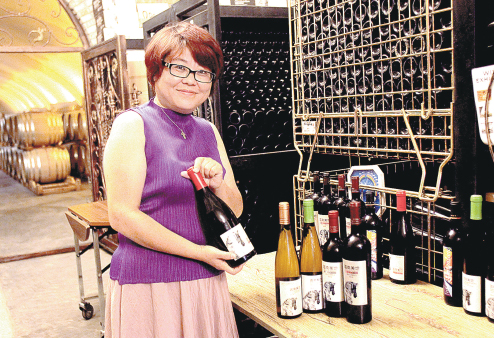Winemakers have 'grape expectations'
By Wang Hao and Li Xiang (China Daily) Updated: 2015-09-01 08:20
 |
|
Wang Fang, owner of Ningxia-based Kanaan Winery and 18 hectares of vineyards. [Photo/China Daily] |
In late summer, pre-harvest rains can be a problem for the 43-year-old housewife-turned-business woman. But she looks unperturbed as a brief shower soaks the arable land outside.
Instead, she invites her guests to try another glass of Wild Pony 2014 vintage, which is from her winery.
"Wild Pony is our entry-level red wine, which costs 150 yuan ($23.4) a bottle" Wang said. "Fresh, approachable but wild and full of personality," she chuckled.
In many ways, it represents the region it is from. Situated about 900 kilometers west of Beijing, Ningxia has become a popular location for China's wine industry.
But when Wang arrived four years ago from Germany, the austere landscape hardly looked like grape growing country. "It was simply an area of barren land with thorned bushes," she said. "Since I love wine, I was slightly doubtful about getting involved in the business as I knew nothing about grape cultivation and wine production."
Eventually, she decided to give it a go. With the help of her father Wang Fengyu, she set up the Kanaan Winery. Kanaan is the German name for the biblical region in the Middle East and described as a fertile "land of milk and honey" in 1500 BC.
Along with the vineyard, she has invested more than 25 million yuan ($3.91 million) in the business. But the cost has been worth it as Ningxia is ideally suited for growing grapes.
In the west, the Helan Mountain range shelters the vineyards from cold winds and sand storms from the Gobi desert.
- 2015 China International Fair for Investment and Trade kicks off in Xiamen
- China's commodity imports robust in Jan-Aug period
- China stocks rebound 2.92%
- 2015 China box office already past 2014 total
- China foreign trade decline widens in August
- Interview: JP Morgan's senior executive bullish on China
- Innovation, development the focus for NZ mayors
- Lives of freelancers

















